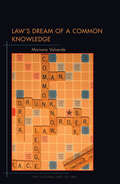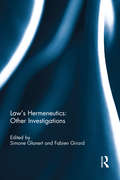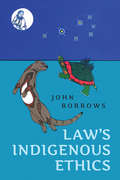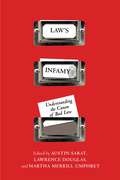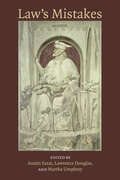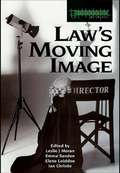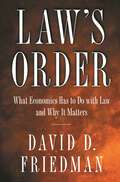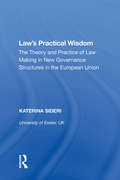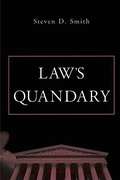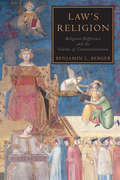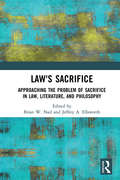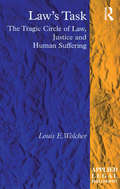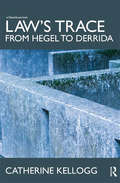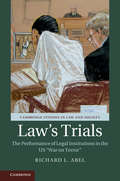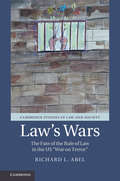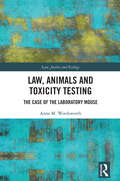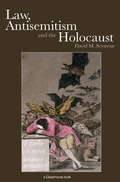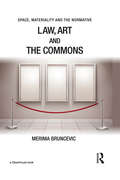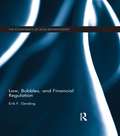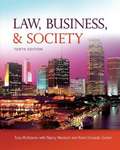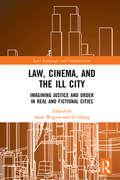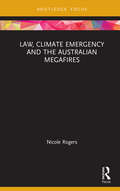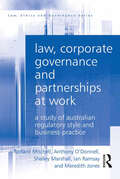- Table View
- List View
Law's Dream of a Common Knowledge (The Cultural Lives of Law)
by Mariana ValverdeIf knowledge is power, then the power of law can be studied through the lens of knowledge. This book opens up a substantive new area of legal research--knowledge production--and presents a series of case studies showing that the hybridity and eclecticism of legal knowledge processes make it unfruitful to ask questions such as, "Is law becoming more dominated by science?" Mariana Valverde argues that legal decision making cannot be understood if one counterposes science and technology, on the one hand, to common knowledge and common sense on the other. The case studies of law's flexible collage of knowledges range from determinations of drunkenness made by liquor licensing inspectors and by police, through police testimony in "indecency" cases, to how judges define the "truth" of sexuality and the harm that obscenity poses to communities. Valverde emphasizes that the types of knowledge that circulate in such legal arenas consist of "facts," values, and codes from numerous incompatible sources that combine to produce interesting hybrids with wide-ranging legal and social effects. Drawing on Foucaultian and other analytical tools, she cogently demonstrates that different modes of knowledge, and hence various forms of power, coexist happily. Law's Dream of a Common Knowledge underlines the importance of analyzing dynamically how knowledge formation works. And it helps us to better understand the workings of power and resistance in a variety of contemporary contexts. It will interest scholars and students from disciplines including law, sociology, anthropology, history, and science-and-technology studies as well as those concerned with the particular issues raised by the case studies.
Law's Empire
by Ronald M. DworkinWith the incisiveness and lucid style for which he is renowned, Ronald Dworkin has written a masterful explanation of how the Anglo-American legal system works and on what principles it is grounded. Law's Empire is a full-length presentation of his theory of law that will be studied and debated--by scholars and theorists, by lawyers and judges, by students and political activists--for years to come. Dworkin begins with the question that is at the heart of the whole legal system: in difficult cases how do (and how should) judges decide what the law is? He shows that judges must decide hard cases by interpreting rather than simply applying past legal decisions, and he produces a general theory of what interpretation is--in literature as well as in law--and of when one interpretation is better than others. Every legal interpretation reflects an underlying theory about the general character of law: Dworkin assesses three such theories. One, which has been very influential, takes the law of a community to be only what the established conventions of that community say it is. Another, currently in vogue, assumes that legal practice is best understood as an instrument of society to achieve its goals. Dworkin argues forcefully and persuasively against both these views: he insists that the most fundamental point of law is not to report consensus or provide efficient means to social goals, but to answer the requirement that a political community act in a coherent and principled manner toward all its members. He discusses, in the light of that view, cases at common law, cases arising under statutes, and great constitutional cases in the Supreme Court, and he systematically demonstrates that his concept of political and legal integrity is the key to Anglo-American legal theory and practice.
Law's Fragile State
by Mark Fathi MassoudHow do a legal order and the rule of law develop in a war-torn state? Using his field research in Sudan, Massoud uncovers how colonial administrators, postcolonial governments, and international aid agencies have used legal tools and practices to promote stability and their own visions of the rule of law amid political violence and war in Sudan. Refuting the conventional wisdom of a legal vacuum in failed states, this book offers a thoughtful and readable account of the important ways that law matters in even the most extreme cases of states still fighting for political stability. Law's Fragile State helps scholars, students, policymakers, and the interested public to make sense of Sudan and what law does, and what it fails to do, in the world's most desperate environments.
Law's Hermeneutics: Other Investigations
by Fabien Girard Simone GlanertBringing together leading academics hailing from different cultural and scholarly horizons, this book revisits legal hermeneutics by making particular reference to philosophy, sociology and linguistics. On the assumption that theory has much to teach law, that theory motivates and enables, the writings of such intellectuals as Martin Heidegger, Hans-Georg Gadamer, Jacques Derrida, Paul Ricœur, Giorgio Agamben, Jürgen Habermas, Ronald Dworkin and Ludwig Wittgenstein receive special consideration. As it explores the matter of reading the law and as it inquires into the emergence of meaning within the dynamic between reader and text against the background of the reader’s worldly finiteness, this collection of essays wishes to contribute to an improved appreciation of the merits and limits of law’s hermeneutics which, it argues, is emphatically not to be reduced to a simple tool for textual exegesis.
Law's Indigenous Ethics
by John BorrowsLaw’s Indigenous Ethics examines the revitalization of Indigenous peoples’ relationship to their own laws and, in so doing, attempts to enrich Canadian constitutional law more generally. Organized around the seven Anishinaabe grandmother and grandfather teachings of love, truth, bravery, humility, wisdom, honesty, and respect, this book explores ethics in relation to Aboriginal issues including title, treaties, legal education, and residential schools. With characteristic depth and sensitivity, John Borrows brings insights drawn from philosophy, law, and political science to bear on some of the most pressing issues that arise in contemplating the interaction between Canadian state law and Indigenous legal traditions. In the course of a wide-ranging but accessible inquiry, he discusses such topics as Indigenous agency, self-determination, legal pluralism, and power. In its use of Anishinaabe stories and methodologies drawn from the emerging field of Indigenous studies, Law’s Indigenous Ethics makes a significant contribution to scholarly debate and is an essential resource for readers seeking a deeper understanding of Indigenous rights, societies, and cultures.
Law's Infamy: Understanding the Canon of Bad Law
by UnknownAn analysis of how problematic laws ought to be framed and consideredFrom the murder of George Floyd to the systematic dismantling of voting rights, our laws and their implementation are actively shaping the course of our nation. But however abhorrent a legal decision might be—whether Dred Scott v. Sanford or Plessy v. Ferguson—the stories we tell of the law’s failures refer to their injustice and rarely label them in the language of infamy. Yet in many instances, infamy is part of the story law tells about citizens’ conduct. Such stories of individual infamy work on both the social and legal level to stigmatize and ostracize people, to mark them as unredeemably other. Law’s Infamy seeks to alter that course by making legal actions and decisions the subject of an inquiry about infamy. Taken together, the essays demonstrate how legal institutions themselves engage in infamous actions and urge that scholars and activists label them as such, highlighting the damage done when law itself acts infamously and focus of infamous decisions that are worthy of repudiation. Law's Infamy asks when and why the word infamy should be used to characterize legal decisions or actions. This is a much-needed addition to the broader conversation and questions surrounding law’s complicity in evil.
Law's Mistakes
by Austin Sarat Lawrence Douglas Martha Merrill UmphreyFrom false convictions to botched executions, from erroneous admission of evidence in a criminal trial to misunderstandings that arise in the process of creating contracts, law is awash in mistakes. These mistakes can be unintentional deviations from expected practices or the result of intentional actions that produce unintended negative consequences. They may become part of a process of response and correction or be accepted as an inevitable cost of action. Some mistakes are external to law itself, such as errors in an agreement made by two private parties. Others are made by legal actors in the course of their work; for example, a police officer’s failing to obtain a search warrant when one was required. The essays in Law’s Mistakes explore the things that law recognizes as errors and the way it responds to them. They identify the jurisprudential and political perspectives that underlie different understandings of what is or is not a legal mistake, and examine the fraught, contested, and evolving relationship between law and error. And they offer templates for thinking about what mistakes can tell us about the aspirations and limits of law, and for understanding how our imagining of law is enabled and shaped by its juxtaposition to a condition labeled mistake. In addition to the volume editors, contributors include Paul Schiff Berman, Sonali Chakravarti, Jody L. Medeira, Stewart Motha, Kunal Parker, and Jordan Steiker.
Law's Moving Image
by Ian Christie Elena Loizidou Leslie J Moran Emma SandonThis book is an essential introduction to the complex issues and debates in the field of law and film. It explores interconnections that are usually ignored between law and film through three main themes: A Fantastic Jurisprudence explores representations of law in law Law, Aesthetics and Visual Technologies focuses on the visual aspects of law's moving image Regulation: Histories, Cultures, Practices brings together work on different dimensions and contexts of regulation, censorship, state subsidies and intellectual property to explore the complex inter-relationship between the state, industry and private regulation. Law's Moving Image is an innovative, multi-disciplinary contribution to the rapidly growing fields of study in law and film, law and visual culture, law and culture, criminology, social and cultural studies. It will be of interest to students and academics involved in these areas.
Law's Order: What Economics Has to Do with Law and Why It Matters
by David D. FriedmanWhat does economics have to do with law? Suppose legislators propose that armed robbers receive life imprisonment. Editorial pages applaud them for getting tough on crime. Constitutional lawyers raise the issue of cruel and unusual punishment. Legal philosophers ponder questions of justness. An economist, on the other hand, observes that making the punishment for armed robbery the same as that for murder encourages muggers to kill their victims. This is the cut-to-the-chase quality that makes economics not only applicable to the interpretation of law, but beneficial to its crafting. Drawing on numerous commonsense examples, in addition to his extensive knowledge of Chicago-school economics, David D. Friedman offers a spirited defense of the economic view of law. He clarifies the relationship between law and economics in clear prose that is friendly to students, lawyers, and lay readers without sacrificing the intellectual heft of the ideas presented. Friedman is the ideal spokesman for an approach to law that is controversial not because it overturns the conclusions of traditional legal scholars--it can be used to advocate a surprising variety of political positions, including both sides of such contentious issues as capital punishment--but rather because it alters the very nature of their arguments. For example, rather than viewing landlord-tenant law as a matter of favoring landlords over tenants or tenants over landlords, an economic analysis makes clear that a bad law injures both groups in the long run. And unlike traditional legal doctrines, economics offers a unified approach, one that applies the same fundamental ideas to understand and evaluate legal rules in contract, property, crime, tort, and every other category of law, whether in modern day America or other times and places--and systems of non-legal rules, such as social norms, as well. This book will undoubtedly raise the discourse on the increasingly important topic of the economics of law, giving both supporters and critics of the economic perspective a place to organize their ideas.
Law's Practical Wisdom: The Theory and Practice of Law Making in New Governance Structures in the European Union
by Katerina SideriThis book develops a sociological understanding of law making in the European Union. In particular, the book focuses on the social function of law in new governance structures promoting decentralized and flexible procedures that encourage deliberation, participation of stakeholders, and public dialogue. It pays attention to both the practical knowledge and the power relations underpinning law making, while seeking to bring to the foreground the importance of compromise in the process. The empirical substantiation of the argument discusses the regulation of technology in the European Union and is premised on case studies of governance of the Internet, patents of high technology, filters used on the Internet to block harmful material, trademark law and domain name dispute resolution by ICANN. To this effect, the book studies the dynamics of constructing a legal argument inside the European Commission, and its role in the process of coordinating the creation of networks, securing enforcement in self regulatory regimes, and steering activity on the part of autonomous groups of actors.
Law's Quandary
by Steven D. SmithThis lively book reassesses a century of jurisprudential thought from a fresh perspective, and points to a malaise that currently afflicts not only legal theory but law in general. Steven Smith argues that our legal vocabulary and methods of reasoning presuppose classical ontological commitments that were explicitly articulated by thinkers from Aquinas to Coke to Blackstone, and even by Joseph Story. But these commitments are out of sync with the world view that prevails today in academic and professional thinking. So our law-talk thus degenerates into "just words"--or a kind of nonsense. The diagnosis is similar to that offered by Holmes, the Legal Realists, and other critics over the past century, except that these critics assumed that the older ontological commitments were dead, or at least on their way to extinction; so their aim was to purge legal discourse of what they saw as an archaic and fading metaphysics. Smith's argument starts with essentially the same metaphysical predicament but moves in the opposite direction. Instead of avoiding or marginalizing the "ultimate questions," he argues that we need to face up to them and consider their implications for law.
Law's Religion
by Benjamin L. BergerPrevailing stories about law and religion place great faith in the capacity of legal multiculturalism, rights-based toleration, and conceptions of the secular to manage issues raised by religious difference. Yet the relationship between law and religion consistently proves more fraught than such accounts suggest. In Law's Religion, Benjamin L. Berger knocks law from its perch above culture, arguing that liberal constitutionalism is an aspect of, not an answer to, the challenges of cultural pluralism. Berger urges an approach to the study of law and religion that focuses on the experience of law as a potent cultural force.Based on a close reading of Canadian jurisprudence, but relevant to all liberal legal orders, this book explores the nature and limits of legal tolerance and shows how constitutional law's understanding of religion shapes religious freedom. Rather than calling for legal reform, Law's Religion invites us to rethink the ethics, virtues, and practices of adjudication in matters of religious difference.
Law's Sacrifice: Approaching the Problem of Sacrifice in Law, Literature, and Philosophy
by Brian W. Nail Jeffrey A. EllsworthThis volume examines the relationship between law and sacrifice as a crucial nexus for theorizing the dynamics of creation, destruction, transcendence, and violence within the philosophical and legal discourse of western society. At a time of populist political unrest, what philosophical and theoretical resources are available for conceptualizing the discontent that seems to emanate from practically every sphere of society? What narrative strategies have been employed within literary, theological, philosophical, and legal discourse to tame or mystify human violence? Engaging with the work of preeminent theorists of sacrifice, such as Georges Bataille, René Girard, Giorgio Agamben, and Jacques Derrida this collection examines from an interdisciplinary perspective the sacrificial logic that characterizes the cultural and political dynamics of law in society. The book will be of interest to students and scholars in the field of legal theory and philosophy.
Law's Task: The Tragic Circle of Law, Justice and Human Suffering (Applied Legal Philosophy)
by Louis E. WolcherWhat is the ultimate task of law? This deceptively simple question guides this volume towards a radically original philosophical interpretation of law and justice. Weaving together the philosophical, jurisprudential and ethical problems suggested by five general terms - thinking, human suffering, legal meaning, time and tragedy - the book places the idea of law's ultimate task in the context of what actually happens when people seek to do justice and enforce legal rights in a world that is inflected by the desperation and suffering of the many. It traces the rule of law all the way down to its most fundamental level: the existence of universal human suffering and how it is that law-doers inflict or tolerate that suffering.
Law's Trace: From Hegel to Derrida
by Catherine KelloggLaw's Trace argues for the political importance of deconstruction by taking Derrida’s reading of Hegel as its point of departure. While it is well established that seemingly neutral and inclusive legal and political categories and representations are always, in fact, partial and exclusive, among Derrida’s most potent arguments was that the exclusions at work in every representation are not accidental but constitutive. Indeed, one of the most significant ways that modern philosophy appears to having completed its task of accounting for everything is by claiming that its foundational concepts – representation, democracy, justice, and so on – are what will have always been. They display what Derrida has called a "fabulous retroactivity." This means that such forms of political life as liberal constitutional democracy, capitalism, the rule of law, or even the private nuclear family, appear to be the inevitable consequence of human development. Hegel’s thought is central to the argument of this book for this reason: the logic of this fabulous retroactivity was articulated most decisively for the modern era by the powerful idea of the Aufhebung – the temporal structure of the always-already. Deconstruction reveals the exclusions at work in the foundational political concepts of modernity by ‘re-tracing’ the path of their creation, revealing the ‘always-already’ at work in that path. Every representation, knowledge or law is more uncertain than it seems, and the central argument of Law's Trace is that they are, therefore, always potential sites for political struggle.
Law's Trials: The Performance of Legal Institutions in the US 'War on Terror' (Cambridge Studies in Law and Society)
by Richard L. AbelThe US 'war on terror' has repeatedly violated fundamental rule of law values. When executive and legislature commit such egregious wrongs, courts represent the ultimate defense. Law's Trials: The Performance of Legal Institutions in the US 'War on Terror' offers the first comprehensive account of judicial performance during the 16 years of the Bush and Obama administrations. Abel examines criminal prosecutions of alleged terrorists, courts martial of military personnel accused of law of war violations, military commission trials of 'high value detainees', habeas corpus petitions by Guantánamo detainees, civil damage actions by victims of both the 'war on terror' and terrorism, and civil liberties violations by government officials and Islamophobic campaigners. Law's Trials identifies successful defenses of the rule of law through qualitative and quantitative analyses, comparing the behavior of judges within and between each category of cases and locating those actions in a comparative history of efforts to redress fundamental injustices.
Law's Wars: The Fate of the Rule of Law in the US 'War on Terror' (Cambridge Studies in Law and Society)
by Richard L. AbelThe US 'war on terror', which Bush declared and Obama continued, repeatedly violated fundamental rule of law values. Law's Wars: The Fate of the Rule of Law in the US 'War on Terror' is the first comprehensive account of efforts to resist and correct those violations. It focuses on responses to abuses in Abu Ghraib, efforts by Guantánamo Bay detainees to improve conditions of confinement in and win release, exposés of and efforts to end torture and electronic surveillance, and civilian casualties on the battlefield, including targeted killings. Abel deploys a law and society perspective to construct and analyze detailed narratives of the roles of victims, whistle-blowers, the media, NGOs, lawyers, doctors, politicians, military personnel, foreign governments and international organizations in defending the rule of law. Only by understanding past errors can we hope to prevent their repetition in what promises to be an endless 'war on terror'.
Law, Animals and Toxicity Testing: The Case of the Laboratory Mouse (ISSN)
by Anne M. WordsworthDrawing on our growing knowledge of animal cognition, this book provides a critical analysis of the use of animals in the legal regime and the practice of toxicity testing.Although animal abuse has become a major issue, animal testing remains largely in the shadows, even though it involves substantial cruelty. Toxicity testing, in particular, imposes considerable pain, suffering and ultimately death on those laboratory animals – often mice – chosen to demonstrate the characteristics of chemicals and their commercial potential. This book documents and critically analyzes the animal protection laws of the European Union, the United States and Canada. It not only examines the tests themselves and the suffering they inflict on animals but also exposes the failure of both the testing and the toxicity laws to effectively protect human health and the environment. Finally, the book takes up the potential of alternative non-animal testing methods to replace the current regimen and to reduce current damage to health and the environment.This book will be of interest to scholars and researchers in the fields of animal studies, environmental law and sociolegal studies, as well as activists and others with an interest in ethics and animal rights.
Law, Antisemitism and the Holocaust
by David SeymourWhilst an increasing amount of attention is being paid to law's connection or involvement with National Socialism, less attention is focused upon thinking through the links between law and the emergence of antisemitism. As a consequence, antisemitism is presented as a pre-existent given, as something that is the object, rather than the subject of study. In this way, the question of law's connection to antisemitism is presented as one of external application. In this ironic mimesis of the positivist tradition, the question of a potentially more intimate or dialectical connection between law and antisemitism is avoided. This work differs from these accounts by explaining the relationship between law and antisemitism through a discussion of these issues by critical thinkers from the mid-nineteenth century to the present; that is, from Marx to Agamben through Nietzsche, Sartre, Adorno and Horkheimer, Arendt and Lyotard. Despite the variety that exists between each thinker, one particular common critical theme unites them. That theme is the connections they make, in diverse ways, between legal rights as an expression of modern political emancipation and the emergence and development of the social phenomenon of antisemitism.
Law, Art and the Commons
by Merima BruncevicThe concept of the cultural commons has become increasingly important for legal studies. Within this field, however, it is a contested concept: at once presented as a sphere for creativity, democratic access and freedom of speech, but one that denies property rights and misappropriates the public domain. In this book, Merima Bruncevic takes up the cultural commons not merely as an abstract notion, but in its connection to physical spaces such as museums and libraries. A legal cultural commons can, she argues, be envisioned as a lawscape that can quite literally be entered and engaged with. Focusing largely on art in the context of the copyright regime, but also addressing a number of cultural heritage issues, the book draws on the work of Deleuze and Guattari in order to examine the realm of the commons as a potential space for overcoming the dichotomy between the owner and the consumer of culture. Challenging this dichotomy, it is the productive and creative potential of law itself that is elicited through the book’s approach to the commons as the empirical basis for a new legal framework, which is able to accommodate a multitude of interests and values.
Law, Bubbles, and Financial Regulation: Law, Bubbles, And Financial Regulation (The Economics of Legal Relationships)
by Erik GerdingFinancial regulation can fail when it is needed the most. The dynamics of asset price bubbles weaken financial regulation just as financial markets begin to overheat and the risk of crisis spikes. At the same time, the failure of financial regulations adds further fuel to a bubble. This book examines the interaction of bubbles and financial regulation. It explores the ways in which bubbles lead to the failure of financial regulation by outlining five dynamics, which it collectively labels the "Regulatory Instability Hypothesis." . The book concludes by outlining approaches to make financial regulation more resilient to these dynamics that undermine law.
Law, Business and Society (Tenth Edition)
by Tony McadamsDon't Just Learn the Law, Learn the Law in Context! In the tenth edition of Law, Business, and Society, Tony McAdams discusses the role of the market, ethics/social responsibility, and the law in regulating the complex relationship between business and the larger society. McAdams examines whether the market and ethics/social responsibility have failed, and if government intervention is needed to maintain a healthy relationship between business practice and society's general welfare. The text serves as a general introduction to the legal system, including chapters on constitutional law, the common law of contracts and torts, and employment law. The closely written narrative, edited law cases, contemporary vignettes from daily life and an abundance of thought-provoking questions help convey key points. In addition, Law, Business, and Society precisely conforms to AACSB International accreditation expectations.
Law, Cinema, and the Ill City: Imagining Justice and Order in Real and Fictional Cities (Law, Language and Communication)
by Anne Wagner Le ChengThis book uses film and television as a resource for addressing the social and legal ills of the city. It presents a range of approaches to view the ill city through cinematic and televisual characterization in urban frameworks, political contexts, and cultural settings. Each chapter deconstructs the meaning of urban space as public space while critically generating a focus on order and justice, exploring issues such as state disorder, lawlessness, and revenge. The approach presents a careful balance between theory and application. The original and novel ideas presented in this book will be essential reading for those interested in the presentation of law and place in cultural texts such as film.
Law, Climate Emergency and the Australian Megafires
by Nicole RogersThis book addresses the ways in which the Black Summer megafires influenced the development of climate narratives throughout 2020. It analyses the global pandemic, and its ensuing restrictions, as a countervailing force in the production of such narratives. Lives and properties were lost in the spring and summer of 2019 and 2020, when catastrophic bushfires burnt through millions of hectares of mainland Australia. Nearly three billion native animals died. And for millions of Australians, and others worldwide, it was through the Australian megafires that the global climate emergency became tangible, concrete, no longer a comfortably deferred, albeit problematic abstraction which could be consigned to future generations to deal with. This book explores the legal and other implications of new understandings of climate emergency arising from the fires, and the emergence of a hierarchy of emergencies as the pandemic came to dominate global and domestic political discourses. It examines narratives of culpability, and legal avenues for seeking retribution from government and big fossil fuel emitters. It also considers the impact of the fires on the burgeoning phenomenon of climate activism, particularly in Australia, and the ways in which pandemic restrictions curtailed such activism. Finally, the book reflects on the fires through the lenses offered by climate fiction, and apocalyptic fiction more generally, in order to consider how these shape, and might shape, our responses to them. This important and timely book will appeal to environmental lawyers and socio-legal theorists; as well as other scholars and activists with interests in climate change and its impact. It is recommended for anyone concerned about current and future climate disasters, and the shortcomings in legal, political and popular responses to the climate crisis.
Law, Corporate Governance and Partnerships at Work: A Study of Australian Regulatory Style and Business Practice (Law, Ethics and Governance)
by Shelley Marshall Richard Mitchell Meredith Jones Anthony O'Donnell Ian RamsayThis book examines how businesses manage their labour systems, and particularly how they manage the complex interaction of factors which give rise to instances of 'partnership' style relations between businesses and their employees. The book draws from the literature concerning 'Varieties of Capitalism' (VoC) and the different institutional and regulatory designs inherent in different types of political economy. The book is informed by a new and extensive set of empirical data from Australia that examines the activities of national and multinational business corporations, their outlooks and relationships with stakeholders, and relates these to new and evolving theoretical frameworks based in political economy and law. The book places the Australian regulatory model within this international debate, and assesses the extent to which the system does or does not fit into the general categorisation created in the VoC literature.
